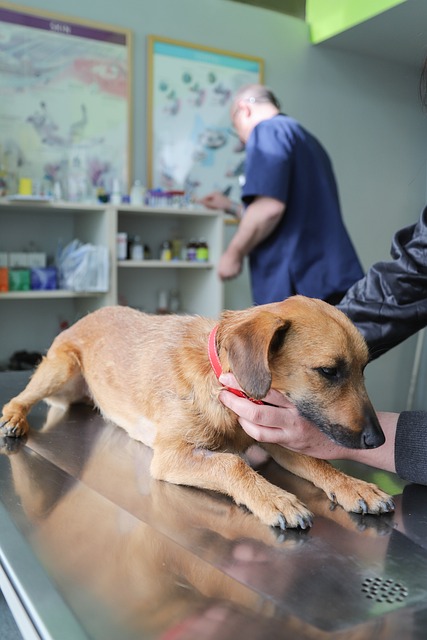Why Is My Dog’s Stomach Hard? The Surprising Answer Revealed

Why is my dog’s stomach hard? If you’ve noticed that your dog’s stomach feels unusually firm or hard to the touch, you may be wondering what could be causing it. A hard stomach in dogs can be a sign of several different underlying issues, ranging from simple digestive problems to more serious conditions.
In this article, we’ll explore some possible reasons why your dog’s stomach might be hard and what you can do about it. We’ll discuss common causes such as gas, bloating, constipation, and potential health concerns that may require veterinary attention. By understanding the possible causes and knowing when to seek professional help, you can ensure the health and well-being of your furry friend.
Possible Causes of a Hard Stomach in Dogs
A hard stomach in dogs can be a cause for concern and may indicate an underlying health issue. There are several possible causes for a hard stomach in dogs. Below are some common causes to be aware of:
- Gastric Dilatation-Volvulus (GDV): Also known as bloat, this is a life-threatening condition where a dog’s stomach fills with gas and twists. It requires immediate veterinary attention.
- Obstruction: A hard stomach can occur if a dog ingests a foreign object that becomes lodged in their digestive system.
- Constipation: When a dog is constipated, their stomach may become firm and bloated.
- Tumors: The presence of a tumor in the abdomen can cause the stomach to feel hard.
- Pancreatitis: Inflammation of the pancreas can lead to stomach discomfort and hardness.
- Ascites: The buildup of fluid in the abdomen can cause the stomach to feel distended and firm.
If your dog’s stomach feels hard, it is important to monitor their behavior and look out for any other concerning symptoms. If you are unsure about the cause or if your dog is showing signs of distress, it is best to consult with a veterinarian for a proper diagnosis and treatment plan.
Symptoms Associated with a Hard Stomach in Dogs
A hard stomach in dogs can be a cause for concern as it may indicate underlying health issues. It is important for dog owners to be aware of the symptoms associated with a hard stomach in dogs, as they can vary depending on the underlying cause. Here is a brief paragraph followed by a bullet list of common symptoms to look out for:
- Abdominal discomfort: Dogs with a hard stomach may display signs of discomfort, such as restlessness, pacing, or reluctance to lie down.
- Distended abdomen: The dog’s stomach may appear bloated or distended, often with an enlarged or swollen appearance.
- Pain or sensitivity: Dogs may exhibit signs of pain or discomfort when their abdomen is palpated or touched.
- Changes in appetite: A dog with a hard stomach may experience a loss of appetite or a decrease in food intake.
- Vomiting or regurgitation: Dogs may vomit or regurgitate food or fluid, especially if the hard stomach is accompanied by digestive issues.
- Lethargy or weakness: Dogs may show signs of lethargy, lack of energy, or weakness, which can be indicative of an underlying problem.
- Changes in bowel movements: Dogs with a hard stomach may have changes in their bowel movements, such as diarrhea or constipation.
- Restlessness or agitation: Some dogs may display signs of restlessness or agitation, often pacing or unable to settle.
- Difficulty breathing: In severe cases, a dog with a hard stomach may have difficulty breathing or show signs of respiratory distress.
- Changes in urination: Dogs may have changes in their urination habits, such as increased frequency, urgency, or difficulty in urinating.
It is important to note that these symptoms may not always indicate a hard stomach, but they can be signs of various underlying conditions. If your dog is displaying any of these symptoms, it is recommended to consult with a veterinarian for a proper diagnosis and appropriate treatment.
When to Seek Veterinary Care for a Dog with a Hard Stomach
A hard stomach in dogs can be a cause for concern and may indicate an underlying health issue. While some cases may resolve on their own, it is important to be aware of when to seek veterinary care for your dog with a hard stomach. Here are some signs and symptoms that should prompt a visit to the veterinarian:
- Severe pain or discomfort: If your dog is exhibiting signs of extreme pain or discomfort, it is important to seek immediate veterinary care.
- Distended or bloated abdomen: A hard stomach accompanied by noticeable bloating or distention can be a sign of a serious condition like Gastric Dilatation-Volvulus (GDV) or bloat, which requires immediate medical attention.
- Difficulty breathing: If your dog is having difficulty breathing or panting excessively in addition to a hard stomach, it may indicate a medical emergency.
- Persistent vomiting or diarrhea: If your dog is experiencing ongoing vomiting or diarrhea in addition to a hard stomach, it could be a sign of gastrointestinal issues or an obstruction.
- Behavioral changes: Any sudden changes in your dog’s behavior or demeanor, such as lethargy, restlessness, or aggression, should be evaluated by a veterinarian.
- Loss of appetite: If your dog is exhibiting a decreased appetite or refusing to eat, it may be a sign of an underlying health issue.
It is important to remember that every dog is different, and these are general guidelines. If you are ever unsure or concerned about your dog’s health, it is always best to consult with a veterinarian. They can provide a proper diagnosis and recommend the appropriate course of treatment for your dog’s specific condition.
Diagnosing a Hard Stomach in Dogs
When a dog’s stomach feels hard, it’s important to determine the underlying cause in order to provide appropriate treatment. While a hard stomach can be a normal reaction to a recent meal or exercise, it can also indicate an underlying health issue. Here’s what to consider when diagnosing a hard stomach in dogs:
- Palpation: Gently feel your dog’s stomach to determine the firmness and any areas of discomfort.
- Observation: Pay attention to your dog’s behavior, appetite, and any other accompanying symptoms.
- Medical history: Discuss any previous health conditions or recent incidents with your veterinarian.
- X-rays or ultrasounds: These imaging techniques can help identify any abnormalities or obstructions in the stomach.
- Blood tests: Blood work can provide insights into possible infections, organ dysfunction, or other systemic issues.
- Urinalysis: Analyzing urine samples can help detect signs of infection or kidney problems.
It’s important to consult with a veterinarian for an accurate diagnosis and appropriate treatment plan. They will consider the symptoms, diagnostic findings, and your dog’s overall health when determining the cause of a hard stomach.
Treatment Options for a Dog with a Hard Stomach
When a dog has a hard stomach, it is important to identify and address the underlying cause. Here are some potential treatment options for a dog with a hard stomach:
- Addressing dietary issues: If the hard stomach is due to dietary issues, such as overeating or consuming inappropriate food, adjusting the dog’s diet and feeding routine may be necessary. This can include portion control, switching to a higher-quality dog food, or implementing a specialized diet recommended by a veterinarian.
- Managing gastrointestinal issues: In cases where gastrointestinal issues, such as indigestion, constipation, or diarrhea, are causing the hard stomach, treatment may involve medications, dietary changes, or the use of probiotics to restore gut health.
- Addressing intestinal blockages: If an intestinal blockage is suspected, immediate veterinary care is necessary. Treatment options may include endoscopy, surgery, or other interventions to remove the obstruction.
- Treating infections or parasites: In cases where infections or parasites are causing the hard stomach, appropriate medications, such as antibiotics or dewormers, may be prescribed by a veterinarian.
- Providing supportive care: Supportive care may include administering fluids, pain medications, or other supportive treatments to alleviate symptoms and improve the dog’s comfort.
It is crucial to consult with a veterinarian to determine the underlying cause of the hard stomach and to develop an appropriate treatment plan tailored to the individual dog’s needs. Prompt veterinary care is essential in ensuring the well-being and health of the dog.
Preventing a Hard Stomach in Dogs
A hard stomach in dogs can be a worrisome sign of an underlying health issue. While some causes may be unavoidable, there are steps you can take to help prevent a hard stomach in your dog and promote their overall digestive health. Here are some tips for preventing a hard stomach in dogs:
- Provide a balanced diet: Feed your dog a nutritious and balanced diet that is appropriate for their age, breed, and health condition. Consult with your veterinarian to determine the best diet for your dog.
- Avoid sudden dietary changes: Gradually introduce new foods or switch to a different diet to prevent digestive upset and a potential hard stomach.
- Monitor portion sizes: Ensure that you are feeding your dog appropriate portion sizes to prevent overeating, which can lead to stomach discomfort.
- Feed at regular intervals: Establish a feeding schedule and stick to it. Regular meals can help maintain a healthy digestive system for your dog.
- Avoid giving table scraps: Human food can be difficult for dogs to digest and can cause stomach issues. Avoid feeding them table scraps to prevent digestive upset.
- Provide access to fresh water: Make sure your dog has access to clean, fresh water at all times to prevent dehydration and promote proper digestion.
- Exercise regularly: Regular exercise can help stimulate digestion and prevent constipation, which can contribute to a hard stomach.
- Prevent access to toxic substances: Keep your dog away from household items, plants, or foods that may be toxic and can cause stomach issues.
- Keep up with preventive healthcare: Regularly visit your veterinarian for check-ups, vaccinations, and parasite prevention to maintain your dog’s overall health and prevent potential stomach problems.
By following these preventive measures, you can help reduce the risk of your dog developing a hard stomach and promote their digestive well-being. Remember to consult your veterinarian if you have any concerns or notice any changes in your dog’s health or behavior.
Common Mistakes in Managing a Dog with a Hard Stomach
When it comes to managing a dog with a hard stomach, it’s important to avoid certain common mistakes that can potentially worsen the condition or delay recovery. Here are some common mistakes to avoid:
- Delaying veterinary care: Ignoring a hard stomach in dogs can be risky, as it may be a sign of a serious underlying condition. It’s important to seek veterinary care promptly to determine the cause and receive appropriate treatment.
- Self-diagnosis and treatment: Trying to diagnose and treat the problem at home without professional guidance can be dangerous. Only a veterinarian can accurately diagnose the cause of a hard stomach and provide the appropriate treatment.
- Administering human medications: Giving human medications to dogs without veterinary approval can be harmful and potentially toxic. Dogs have different physiological characteristics, and certain medications safe for humans may not be safe for dogs.
- Ignoring potential dietary triggers: Certain foods can cause gastrointestinal issues in dogs, leading to a hard stomach. It’s important to identify and eliminate any potential dietary triggers, such as fatty or spicy foods, and stick to a balanced and appropriate diet recommended by a veterinarian.
- Overfeeding or irregular feeding: Overfeeding or feeding irregularly can contribute to digestive issues and a hard stomach. It’s important to follow a consistent feeding schedule and portion control to maintain a healthy digestive system.
- Not providing enough water: Dehydration can exacerbate digestive issues and contribute to a hard stomach. Make sure your dog has access to clean and fresh water at all times to stay properly hydrated.
- Failure to address any underlying medical conditions: Apart from dietary triggers, a hard stomach in dogs can also be caused by underlying medical conditions such as gastrointestinal infections, pancreatitis, or intestinal blockages. It’s crucial to address any underlying conditions with appropriate veterinary care for a complete recovery.
- Delaying or not following prescribed treatment: If a veterinarian prescribes treatment for a dog with a hard stomach, it’s important to follow the instructions diligently. Delaying or not following the prescribed treatment can delay recovery and potentially worsen the condition.
- Stress and anxiety: Dogs can experience stress and anxiety, which can contribute to digestive issues and a hard stomach. It’s important to create a calm and comfortable environment for your dog and address any underlying stress factors to promote overall well-being.
- Not seeking veterinary help for persistent or worsening symptoms: If the symptoms of a hard stomach persist or worsen despite initial treatment or management efforts, it’s crucial to seek additional veterinary help. A veterinarian can reassess the situation, adjust the treatment plan if necessary, and determine if further diagnostic tests are required to identify any underlying issues.
By avoiding these common mistakes and seeking veterinary care, you can ensure the best possible outcome for your dog with a hard stomach and support their overall health and well-being.
When to Call the Veterinarian for a Dog with a Hard Stomach
A hard stomach in dogs can be a cause for concern and may require veterinary attention. While some cases may resolve on their own, certain situations warrant contacting a veterinarian. Here are some guidelines on when to call the veterinarian for a dog with a hard stomach:
- Persistent Discomfort: If your dog’s hard stomach is accompanied by persistent discomfort or pain, it is important to consult with a veterinarian. They can assess the situation and determine the underlying cause.
- Unexplained Bulging or Swelling: If your dog’s abdomen appears to be bulging or swollen, and the cause is unknown, it is recommended to seek veterinary care. This could be a sign of a more serious condition, such as fluid accumulation or an organ enlargement.
- Changes in Behavior or Appetite: If your dog’s hard stomach is accompanied by changes in behavior, such as lethargy or loss of appetite, it could indicate an underlying health issue. A veterinarian can evaluate these symptoms and provide appropriate treatment.
- Difficulty Breathing: If your dog is experiencing difficulty breathing along with a hard stomach, it could be a sign of a serious problem, such as bloat or an internal injury. Immediate veterinary attention is necessary in this situation.
- Vomiting or Diarrhea: If your dog has a hard stomach and is experiencing repeated episodes of vomiting or diarrhea, it is best to contact a veterinarian. These symptoms may be related to a gastrointestinal issue that requires medical attention.
Remember, it is always better to err on the side of caution when it comes to your pet’s health. A veterinarian can provide the necessary expertise and guidance to ensure your dog receives appropriate care for a hard stomach.
Conclusion
A hard stomach in dogs is a concerning symptom that may indicate an underlying health issue. It is important to be aware of the possible causes and associated symptoms. If your dog is experiencing a hard stomach, it is recommended to monitor their behavior and consult with a veterinarian for a proper diagnosis and treatment plan. Prompt veterinary care is crucial in ensuring the well-being and health of your dog.
By taking preventive measures, such as providing a balanced diet, regular exercise, and access to fresh water, you can help reduce the risk of your dog developing a hard stomach. Avoid common mistakes in managing a dog with a hard stomach, such as self-diagnosis and treatment, delaying veterinary care, or administering human medications. Remember to seek veterinary help if your dog’s symptoms persist, worsen, or are accompanied by severe discomfort or other concerning symptoms.
By being proactive in your dog’s health and seeking appropriate veterinary care, you can ensure the best possible outcome for your dog and promote their overall well-being.







Thank you for your sharing. I am worried that I lack creative ideas. It is your article that makes me full of hope. Thank you. But, I have a question, can you help me?